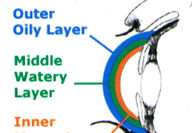Sorted by date Results 1 - 12 of 12
In the last article, I discussed some of the symptoms and causes of Ocular Surface Disease, or dry eye as it is usually called. Now let’s study some of the ways you can prevent damage from happening to the eye surface. As I mentioned before, blinking fully so the eyelids touch every 10-15 seconds help supply the eye surface with lubricating fluids. Recent studies with high speed cameras show that when you blink the eyelids not only touch, but also move past each other, which helps mix the oils from top and bottom with the w...

Ocular Surface Disease, or dry eye as it is commonly called, is a progressive disease that not only causes short term blur and discomfort, but can also cause blindness over time when not diagnosed and treated properly. It is an eye disease I see daily, if not several times per day. It's also a problem that I am seeing even in young people more and more. For years, the most common treatment we've had is over the counter eye drops of different thicknesses. As the science on...

On Aug. 21, we will experience a phenomenon that comes around only once every 100 years or so, a solar eclipse visible in Cheney. While this may be neat to see, don't look at it unless you have the proper safety lenses that block out the sun's deadly rays. The reason is because the sun's intensity when viewed directly, even for a few seconds, can not only make vision painful; they can also permanently blind you. It's because the eye focuses light like a magnifying glass onto...
Our understanding of glaucoma has increased dramatically over the years. Originally it was discovered as a very high pressure in the eye; that occurred with severe pain inside the eye, and redness on the surface. This led to blindness, unless the intra-ocular pressure (IOP) was reduced substantially. Later it was discovered that blindness was occurring gradually in people with modestly high intraocular pressures. It was also noted that certain types of optic nerve changes were occurring along with the elevated IOP’s. As v...
With school coming soon it’s time to have your children’s eyes examined. Did you know that with new national health care laws all health insurances allow an eye exam and materials for all covered children? It’s been found that 80 percent of learning is done visually. However the National Commission on Vision and Health found that one in four children have an undetected vision problem. Also 25 percent of school-age children suffer from vision problems that could have been addressed or eliminated if appropriate eye asses...
Cornelius: “My eyes been waterin’ a lot since I tried petting our new kitty. Maybe I got allergies.” Glandy: “Whooee, my eyes are waterin too. What color were that there cat?” Cornelius: “Oh, black with a little white stripe.” Do your eyes feel dry, sandy, burn, itch, or water at times? Do you find vision blurred or fluctuating as you read or work on the computer? You may have what we call Ocular Surface Disease. Many think it’s just allergies, or they just put up with it, when in reality there is a whole new science of test...
Dessi: “Doctor said I needed these nifty colored glasses to hep wit my contacts; but I can’t tell if they’re the right size.” Mey: “Dessi, those are drinkin glasses; go back and get some seein glasses.” Often I see patients that say they can’t wear contacts any more due to irritation. In fact, this is one of the most common reasons for contact lens discontinuance nationwide, if not the world. The causes are varied, but often have some similarities. First, and possibly foremost, is the over wear of contacts. People assume...
Ret and Ina were out for a leisurely stroll through the jungle (the back yard). Ret was looking at the twisty branches of the willow trees, when he noticed one was a bit off color. Just as he reached out to get a closer look, Ina shouted, “Stop! That branch slithered.” For years it’s been known that twisty blood vessels in the skin, on the back of one’s leg, was a dreaded sign of aging. When seen in the eye, it’s also been a sign of high blood pressure. For years when I saw these twisty ocular blood vessels, 90 percent o...
Lens and Iris were watching trailers for upcoming movies. When the food advertisements started, Iris asked Lens, ”Could you go get us some popcorn?” Lens replied, “Don’t have to; this is a 3-D movie, and the food’ll come floating by any moment.” Have you experienced troubles watching the new 3-D movies at the theatre? Do they make you feel eye strain, double or blurred vision? It’s often due to problems using both eyes together in a coordinated manner. For instance, a need for correction change, especially if one eye needs...
Mac looked in the mirror with horror at his eyes. Startled, his wife, Ula, asked, “What’s wrong?” “I don’t look young anymore,” gasped Mac. “You can thank UV light for that,” huffed Ula. Mac countered, “You mean it wasn’t from the kids?” Though ultraviolet light can give you a nice tan and vitamin D for good health, too much can be harmful. This light can enter the eye, not only from failing to wear eye sun protection, but recent studies also show that it can be reflected off the back lens surface and cause similar damage. Th...
Lenz: “This here computer is makin my vision fuzzy.” Iris: “Are ya wearin yer readin glasses?” Lenz: “Oh, yeah, I fergot about that.” Millions of people each day suffer from Computer Vision Syndrome. Its symptoms include blurred vision, eyestrain, headaches, body fatigue, eye irritation (dryness), and yes even a stiff neck. Blurred vision can occur from a variety of causes. Sometimes just a slight change in correction can make a big difference in vision clarity- especially for those needing that first reading lens at any...
Bif: “Boy, do I feel dizzy!” Calli: “You been drinkin’ again?” Bif: “No.” Calli: “Get in an accident?” Bif: “No.” Calli: “ Are ya sick?” Bif: “No, I jus got my new glasses.” Have you heard of the new digital lenses that are available? For the first time in 50-60 years the way lenses are ground to make the prescription is different. The power of a lens is due to three things: one, front lens curvature, two, lens density and three, back lens curvature. Originally the main curvature was ground on the front lens surface. Later...